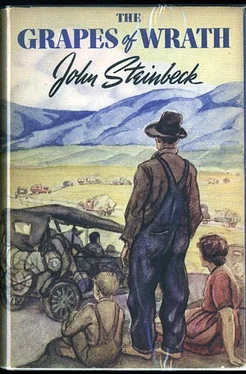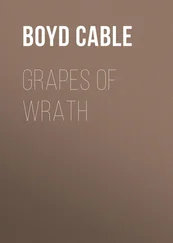John Steinbeck - The Grapes of Wrath
Здесь есть возможность читать онлайн «John Steinbeck - The Grapes of Wrath» весь текст электронной книги совершенно бесплатно (целиком полную версию без сокращений). В некоторых случаях можно слушать аудио, скачать через торрент в формате fb2 и присутствует краткое содержание. Город: New York, Год выпуска: 1939, Издательство: The Viking Press-James Lloyd, Жанр: Классическая проза, на английском языке. Описание произведения, (предисловие) а так же отзывы посетителей доступны на портале библиотеки ЛибКат.
- Название:The Grapes of Wrath
- Автор:
- Издательство:The Viking Press-James Lloyd
- Жанр:
- Год:1939
- Город:New York
- ISBN:нет данных
- Рейтинг книги:5 / 5. Голосов: 1
-
Избранное:Добавить в избранное
- Отзывы:
-
Ваша оценка:
- 100
- 1
- 2
- 3
- 4
- 5
The Grapes of Wrath: краткое содержание, описание и аннотация
Предлагаем к чтению аннотацию, описание, краткое содержание или предисловие (зависит от того, что написал сам автор книги «The Grapes of Wrath»). Если вы не нашли необходимую информацию о книге — напишите в комментариях, мы постараемся отыскать её.
The Grapes of Wrath — читать онлайн бесплатно полную книгу (весь текст) целиком
Ниже представлен текст книги, разбитый по страницам. Система сохранения места последней прочитанной страницы, позволяет с удобством читать онлайн бесплатно книгу «The Grapes of Wrath», без необходимости каждый раз заново искать на чём Вы остановились. Поставьте закладку, и сможете в любой момент перейти на страницу, на которой закончили чтение.
Интервал:
Закладка:
“Then what, Tom?”
“Then it don’ matter. Then I’ll be all aroun’ in the dark. I’ll be ever’where—wherever you look. Wherever they’s a fight so hungry people can eat, I’ll be there. Wherever they’s a cop beatin’ up a guy, I’ll be there. If Casy knowed, why, I’ll be in the way guys yell when they’re mad an’—I’ll be in the way kids laugh when they’re hungry an’ they know supper’s ready. An’ when our folks eat the stuff they raise an’ live in the houses they build—why, I’ll be there. See? God, I’m talkin’ like Casy. Comes of thinkin’ about him so much. Seems like I can see him sometimes.”
“I don’ un’erstan’,” Ma said. “I don’ really know.”
“Me neither,” said Tom. “It’s jus’ stuff I been thinkin’ about. Get thinkin’ a lot when you ain’t movin’ aroun’. You got to get back, Ma.”
“You take the money then.” He was silent for a moment. “Awright,” he said. “An’, Tom, later—when it’s blowed over, you’ll come back. You’ll find us?”
“Sure,” he said. “Now you better go. Here, gimme your han’.” He guided her toward the entrance. Her fingers clutched his wrist. He swept the vines aside and followed her out. “Go up to the field till you come to a sycamore on the edge, an’ then cut acrost the stream. Good-by.”
“Good-by,” she said, and she walked quickly away. Her eyes were wet and burning, but she did not cry. Her footsteps were loud and careless on the leaves as she went through the brush. And as she went, out of the dim sky the rain began to fall, big drops and few, splashing on the dry leaves heavily. Ma stopped and stood still in the dripping thicket. She turned about—took three steps back toward the mound of vines; and then she turned quickly and went back toward the boxcar camp. She went straight out to the culvert and climbed up on the road. The rain had passed now, but the sky was overcast. Behind her on the road she heard footsteps, and she turned nervously. The blinking of a dim flashlight played on the road. Ma turned back and started for home. In a moment a man caught up with her. Politely, he kept his light on the ground and did not play it in her face.
“Evenin’,” he said. Ma said, “Howdy.”
“Looks like we might have a little rain.”
“I hope not. Stop the pickin’. We need the pickin’.”
“I need the pickin’, too. You live at the camp there?”
“Yes, sir.” Their footsteps beat on the road together. “I got twenty acres of cotton. Little late, but it’s ready now.
Thought I’d go down and try to get some pickers.”
“You’ll get ’em awright. Season’s near over.”
“Hope so. My place is only a mile up that way.”
“Six of us,” said Ma. “Three men an’ me an’ two little fellas.”
“I’ll put out a sign. Two miles—this road.”
“We’ll be there in the mornin’.”
“I hope it don’t rain.”
“Me too,” said Ma. “Twenty acres won’ las’ long.”
“The less it lasts the gladder I’ll be. My cotton’s late. Didn’ get it in till late.”
“What you payin’, mister?”
“Ninety cents.”
“We’ll pick. I hear fellas say nex’ year it’ll be seventy-five or even sixty.”
“That’s what I hear.”
“They’ll be trouble,” said Ma. “Sure. I know. Little fella like me can’t do anything. The Association sets the rate, and we got to mind. If we don’t—we ain’t got a farm. Little fella gets crowded all the time.”
They came to the camp. “We’ll be there,” Ma said. “Not much pickin’ lef’.” She went to the end boxcar and climbed the cleated walk. The low light of the lantern made gloomy shadows in the car. Pa and Uncle John and an elderly man squatted against the car wall.
“Hello,” Ma said. “Evenin’, Mr. Wainwright.”
He raised a delicately chiseled face. His eyes were deep under the ridges of his brows. His hair was blue-white and fine. A patina of silver beard covered his jaws and chin. “Evenin’, ma’am,” he said.
“We got pickin’ tomorra,” Ma observed. “Mile north. Twenty acres.”
“Better take the truck, I guess,” Pa said. “Get in more pickin’.” Wainwright raised his head eagerly. “S’pose we can pick?”
“Why, sure. I walked a piece with the fella. He was comin’ to get pickers.”
“Cotton’s nearly gone. Purty thin, these here seconds. Gonna be hard to make a wage on the seconds. Got her pretty clean the fust time.”
“Your folks could maybe ride with us,” Ma said. “Split the gas.”
“Well—that’s frien’ly of you, ma’am.”
“Saves us both,” said Ma. Pa said, “Mr. Wainwright—he’s got a worry he come to us about. We was a-talkin’ her over.”
“What’s the matter?” Wainwright looked down at the floor. “Our Aggie,” he said. “She’s a big girl—near sixteen, an’ growed up.”
“Aggie’s a pretty girl,” said Ma. “Listen ’im out,” Pa said. “Well, her an’ your boy Al, they’re a-walkin’ out ever’ night. An’ Aggie’s a good healthy girl that oughta have a husban’, else she might git in trouble. We never had no trouble in our family. But what with us bein’ so poor off, now, Mis’ Wainwright an’ me, we got to worryin’. S’pose she got in trouble?”
Ma rolled down a mattress and sat on it. “They out now?” she asked. “Always out,” said Wainwright. “Ever’ night.”
“Hm. Well, Al’s a good boy. Kinda figgers he’s a dunghill rooster these days, but he’s a good steady boy. I couldn’ want for a better boy.”
“Oh, we ain’t complainin’ about Al as a fella! We like him. But what scares Mis’ Wainwright an’ me—well, she’s a growed-up woman-girl. An’ what if we go away, or you go away, an’ we find out Aggie’s in trouble? We ain’t had no shame in our family.”
Ma said softly, “We’ll try an’ see that we don’t put no shame on you.”
He stood up quickly. “Thank you, ma’am. Aggie’s a growed-up woman-girl. She’s a good girl—jes’ as nice an’ good. We’ll sure thank you, ma’am, if you’ll keep shame from us. It ain’t Aggie’s fault. She’s growed up.”
“Pa’ll talk to Al,” said Ma. “Or if Pa won’t, I will.”
Wainwright said, “Good night, then, an’ we sure thank ya.” He went around the end of the curtain. They could hear him talking softly in the other end of the car, explaining the result of his embassy.
Ma listened a moment, and then, “You fellas,” she said. “Come over an’ set here.” Pa and Uncle John got heavily up from their squats. They sat on the mattress beside Ma. “Where’s the little fellas?” Pa pointed to a mattress in the corner. “Ruthie, she jumped Winfiel’ an’ bit ’im. Made ’em both lay down. Guess they’re asleep. Rosasharn, she went to set with a lady she knows.” Ma sighed. “I foun’ Tom,” she said softly. “I—sent ’im away. Far off.” Pa nodded slowly. Uncle John dropped his chin on his chest. “Couldn’ do nothin’ else,” Pa said. “Think he could, John?” Uncle John looked up. “I can’t think nothin’ out,” he said. “Don’ seem like I’m hardly awake no more.”
“Tom’s a good boy,” Ma said; and then she apologized, “I didn’ mean no harm a-sayin’ I’d talk to Al.”
“I know,” Pa said quietly. “I ain’t no good any more. Spen’ all my time a-thinkin’ how it use’ ta be. Spen’ all my time thinkin’ of home, an’ I ain’t never gonna see it no more.”
“This here’s purtier—better lan’,” said Ma. “I know. I never even see it, thinkin’ how the willow’s los’ its leaves now. Sometimes figgerin’ to mend that hole in the south fence. Funny! Woman takin’ over the fambly. Woman sayin’ we’ll do this here, an’ we’ll go there. An’ I don’ even care.”
Читать дальшеИнтервал:
Закладка:
Похожие книги на «The Grapes of Wrath»
Представляем Вашему вниманию похожие книги на «The Grapes of Wrath» списком для выбора. Мы отобрали схожую по названию и смыслу литературу в надежде предоставить читателям больше вариантов отыскать новые, интересные, ещё непрочитанные произведения.
Обсуждение, отзывы о книге «The Grapes of Wrath» и просто собственные мнения читателей. Оставьте ваши комментарии, напишите, что Вы думаете о произведении, его смысле или главных героях. Укажите что конкретно понравилось, а что нет, и почему Вы так считаете.











